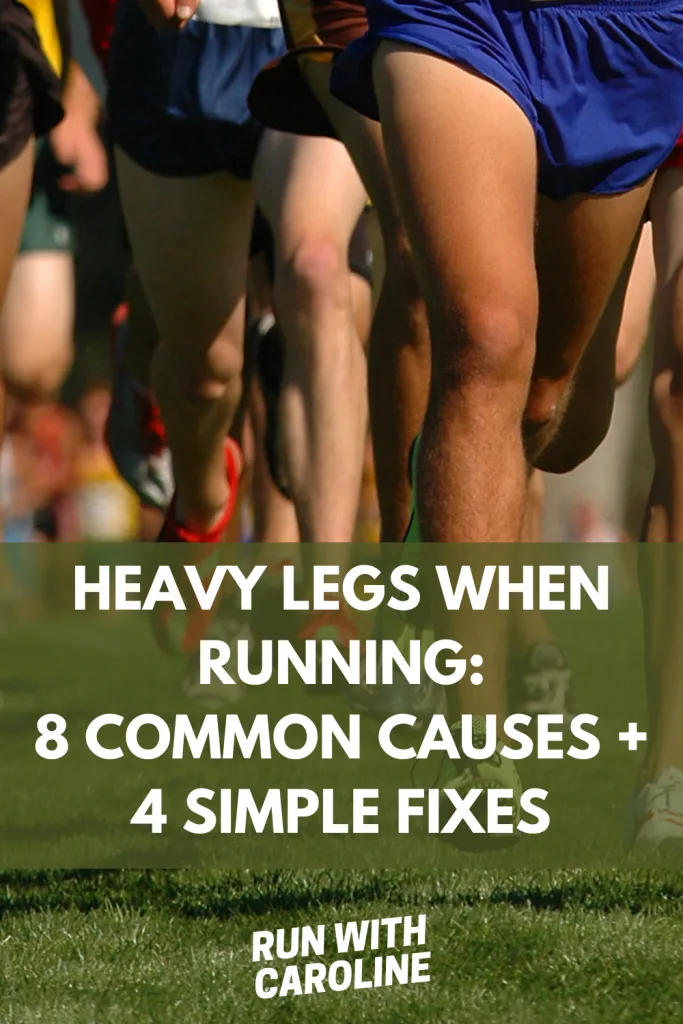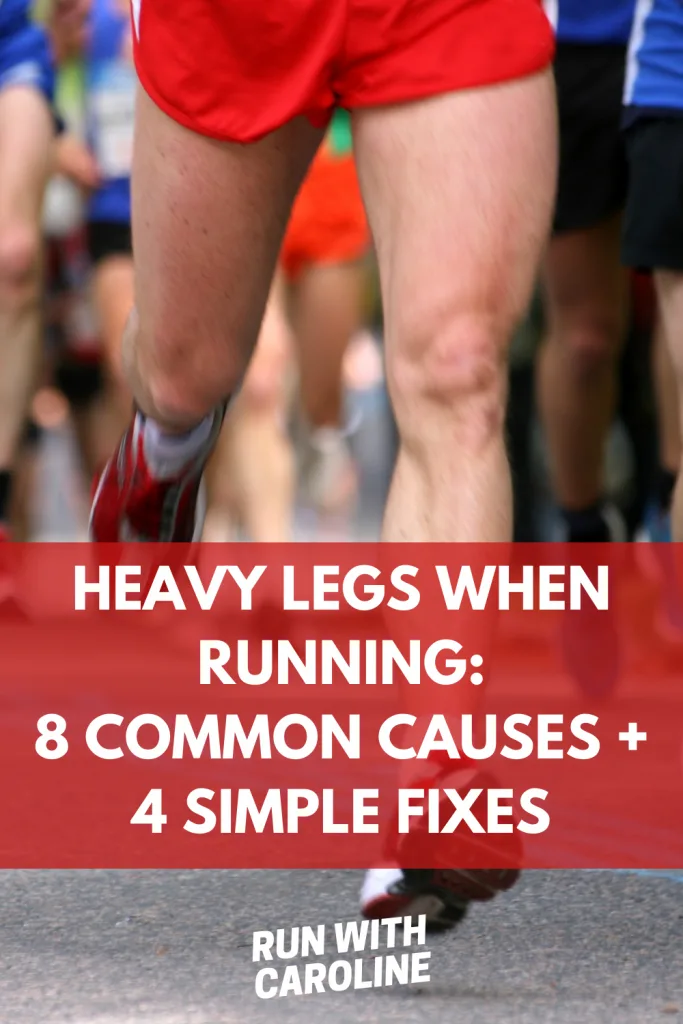Tired, achy and heavy legs when running is a discomfort that discourages many runners from going for a run.
If you’ve ever felt like your legs are tonne weights, then you’re not alone.
The truth is many runners suffer from heavy leg syndrome at one time or another.
The secret is not to let it put you off running for good!
If your legs regularly feel heavy when running or if your legs feel heavy and weak after running, then this could be a sign that you need to re-evaluate your training routine and how you approach your runs.
The good news is with a few simple fixes, you can regain your running mojo and energy during training.
In this guide we’ll explore:
- What are heavy legs when running?
- What are the symptoms of heavy legs when running?
- What causes heavy legs when running?
- Who is at risk of developing heavy legs when running?
- How to prevent heavy legs when running
Ready?
Let’s get started!

What are heavy legs when running?
Heavy legs are often described as legs that feel heavy, tired and stiff – making them feel heavy to move and lift forward.
Some people describe the heavy legs feeling as if they’re dragging around weights that are attached to their legs.
Whatever it feels like for you, we can all agree that it’s an uncomfortable feeling and one we could do without on a run!
Related: Hip pain after running: 8 causes + how to fix it
What are the symptoms of heavy legs when running?
Signs and symptoms of heavy legs when running can vary.
Generally the following symptoms are noted:
- Tired and achy legs
- Stiff and sore legs
- Painful legs
- Legs that feel heavy as if you’re carrying extra weight in them
Related: Knee pain after running: Causes + 10 prevention tips

What causes heavy legs when running?
You may be wondering: “Why do my legs feel heavy when running?”
Poor running form, dehydration, iron deficiency and overtraining have all been attributed to sore and heavy legs.
Here is a list of potential causes of heavy legs when running:
- Overtraining
- Excessive weight training
- Not allocating enough time for recovery
- Poor running form
- Lack of sleep
- Poor nutrition
- Poor circulation
- Dehydration
- Iron deficiency
#1 Overtraining
For the majority of runners, heavy legs when running is normally associated with their training.
If you’re training for a long distance event, for example, the number of miles you’re running each week can sometimes contribute to that ‘heavy legs’ feeling.
If you’re overtraining (e.g. running too many miles each week or not giving yourself enough time to recover in between runs) your legs may feel heavy as a result.
Overtraining, however, is not always linked to a high volume of mileage in your training plan.
It can also be linked to training plans that progress too rapidly or take large jumps in training plans.
Trying to do too much too soon after an injury or break in running is also a common cause of overtraining.
More often than not, overtraining can lead to illness and injury, so don’t be tempted to power through it!
Instead, take a step back for a few days and reduce your overall training until you start to feel better again.
Listen to your body and really tune into how you are feeling on your runs.
Related: 11 symptoms of overtraining: How to overcome running fatigue
#2 Excessive weight training
Whilst strength training is an important aspect of being a strong and healthy runner, excessive amounts of weight training can be detrimental to your performance.
Heavy leg workouts can cause delayed onset muscle soreness (DOMS).
DOMS can cause that familiar heavy legs feeling in the 2 to 3 days after your workout.
It can also impact your running performance.
Related: What is muscle scraping? Benefits + how to do it at home
#3 Not allocating enough time for recovery
Another common cause of heavy legs when running is not allocating enough time to recovery in between runs.
If you’re someone that skips the post-run cool down, ignores active recovery in between runs, or worse doesn’t take rest days seriously, then this could be the reason why your legs feel so heavy.
Related: How to recover after a long run
#4 Poor running form
Improper running form is a major contributing factor to heavy legs when running.
Running form is all about running in the most efficient way possible. It looks at everything from your posture to your footstrike.
The truth is, poor running form, especially when it comes to your posture, footstrike and cadence, can put extra stress on your body which in turn can cause tired and heavy legs when running.
Here are the common causes of heavy legs when running:
- You overstride. If you have a low cadence and you overstride, this means your foot is landing in front of your body when you run, which puts puts extra stress and tension on the foot and leg. Aim to take a shorter stride and have a higher running cadence – which is the number of steps you take per minute.
- Your heel hits the ground first. The way your foot hits the ground (called footstrike) can impact your running form. If you heel strike, this sends impact forces up your leg and into your hips, which can cause strain and pain. Aim to adopt a midfoot strike instead.
- Your posture is off. Your running posture looks at everything from your head and shoulders to your legs and feet. Keep your core stable and balanced and keep your shoulders down and relaxed. Your arms should be at right angles and should not cross your body when running. Keep a slight bend in the knee when you run.
Related: The essential guide to head to toe running form and technique
#5 Lack of sleep
Lack of sleep is linked to many conditions that can impact your running performance, including tired and heavy legs when running.
A 2014 study on the relationship between sleep and exercise concluded that sufficient sleep is essential for the restoration of nervous, immune, skeletal and muscular systems.
Adding that virtually all bodily systems are impacted by poor or inadequate sleep.
Most athletes need between seven to nine hours of sleep each night. Trying to power through a run with just a few hours of sleep is probably not a good idea!
Make a good night’s sleep your priority. If your lifestyle means you can’t get at least seven hours of sleep at night, short afternoon naps may help training feel easier and improve performance.
Related: Running 30 minutes a day: Benefits + expected results after 30 days

#6 Poor nutrition
Nutrition is really important when it comes to being able to run consistently, week in week out.
Carbohydrates are a runner’s best friend when it comes to running long distances, particularly complex carbohydrates.
When you consume carbs, your body converts these into energy (also known as glycogen) which your muscles then use as an energy source.
If you do not eat enough carbs before a long run or distance event, your body won’t have enough fuel to sustain the required energy levels during the run.
This can cause tiredness, fatigue and that familiar heavy legs feeling.
Related: Carb loading for runners: Foods to eat and mistakes to avoid
#7 Poor circulation
Poor circulation can be a cause of heavy and tired legs when running.
When there isn’t enough blood circulating to your muscles, there isn’t enough oxygen to convert into energy.
This normally happens when you’re overexerting yourself and trying to run longer distances when you may not be ready.
Related: Taste blood when running? 7 causes + ways to prevent it
#8 Dehydration
Hydration is critical to any form of exercise, whether it be a long run or a quick HIIT workout in your living room.
Of course, the levels of hydration required differ with each form of exercise.
But the end goal is always the same: to replace fluids lost through sweat.
Dehydration, or not drinking enough water, is associated with muscle cramps, fatigue and a dry mouth.
If you’re dehydrated, you might feel like your legs are more tired than usual or the run just feels harder.
To combat this, tune into your body and drink enough fluids throughout the day so you don’t feel thirsty.
If you’re exercising more than normal, then it’s important you adjust hydration according to your activity levels.
The weather may also mean you need more fluids on those hot runs.
Related: Hydration and running performance: 4 key hydration tips for runners
#9 Iron deficiency
If you regularly experience tiredness, fatigue and heavy legs when running, then it’s worth checking your iron levels.
Iron deficiency means your body has a more difficult time supplying oxygen to your muscles on a run, which can result in a heavy leg feeling.
Most runners get enough iron in their diet.
However, there are times when your eating habits may mean it’s more challenging to get the recommended intake.
With a vegetarian or vegan diet, it’s important you eat a variety of iron-rich foods such as dark leafy vegetables, pulses and wholemeal bread to maintain your iron levels.
Iron supplements in the form of a daily tablet are also an option but shouldn’t be your only source of iron.
If you’re a female runner, then your period may mean you’re at a greater risk of iron deficiency, especially if you suffer from heavy menstrual bleeding.
A quick blood test with your GP will help you identify if you’re suffering from iron deficiency.
Related: When does period weight go away? All your questions answered

Who is at risk of developing heavy legs when running?
You are at risk of developing heavy legs when running if you:
- Overtrain
- Skip rest days or don’t allocate enough time for recovery
- Have poor running form
- Have poor circulation
- Follow a low carb diet
- Have poor nutrition
- Are dehydrated
- Have low iron levels
Related: IT band syndrome: How to fix it + 7 training mistakes to avoid
How to prevent heavy legs when running
#1 Warm up before each run
The warm up is important to prepare yourself mentally and physically for the run.
It will also help to reduce the risk of you developing injuries and muscle soreness and stiffness after a run.
A proper warm up should last between 15-20 minutes and should consist of two main parts:
- Jogging
- Dynamic stretches
Both of these will help you mobilise your muscles and joints before a run.
You may also want to include some running drills in your warm up.
#2 Cool down after each run
If you suffer from tight or stiff muscles or muscle soreness, then a cool down after a run will help to bring your heart rate down and stretch parts of your body involved in running.
Cool down stretching (also known as static stretching) is when you hold the stretch to the end of its range of motion for roughly 20 to 45 seconds.
Try and give yourself 10 minutes at the end of each run to bring your heart rate down and stretch parts of your body involved in running.
Your quadriceps, hamstrings, glutes, hips, back and arms are all utilised when running. Make sure you target each muscle group to help alleviate any soreness or pain.
Here are some sample stretches that you can do as part of a cool down. Hold the stretch for at least 20 seconds before moving onto the next stretch:
- Deep lunge stretch
- Standing quad stretch
- Standing adductor stretch
- Standing TFL stretch
- Lying gluteal stretch
- Standing calf stretch
Related: The best cool down stretches to do after a run
#3 Foam roll
Foam rolling is another great way to alleviate muscle stiffness and soreness after a run.
One of the foremost benefits of foam rolling is that it improves circulation and increases blood flow to your muscles.
The other benefit to foam rolling is that it loosens up your muscles. If you have stiff muscles, it makes it harder to perform on long runs and shorter, speedier runs.
Consider including foam rolling as part of your warm up before a run and cool down after a run.
Related: Foam rolling benefits for runners
#4 Wear the right running shoes
A good pair of running shoes that support your feet are essential when running longer distances.
You’ll want a pair of running shoes that support your feet when you run and provide flexibility and durability.
You can find more information in my guide on how to choose the right pair of running shoes.
#5 Perfect your running form
Running form is incredibly important to help prevent common running injuries and help keep you strong and healthy as a runner.
Review your running form to understand what could be improved.
You can read my guide on proper running form and technique for more information and tips.
#6 Limit the amount of weight training
If you do a lot of weight training and regularly suffer with heavy and tired legs, then it may be a sign that you need to limit the amount of weight training in your training plan.
Aim to do no more than two strength training sessions per week. You’ll also want to limit the amount of heavy leg workouts in your routine.
If you’re combining strength training with running, aim to do the strength workout after running.
More tips on recovery and performance:
- 5 things I wish I’d known before returning to running - March 3, 2024
- Running 20 minutes a day: Benefits + how to start - January 27, 2024
- How to run your first 2 hour half marathon - January 16, 2024
